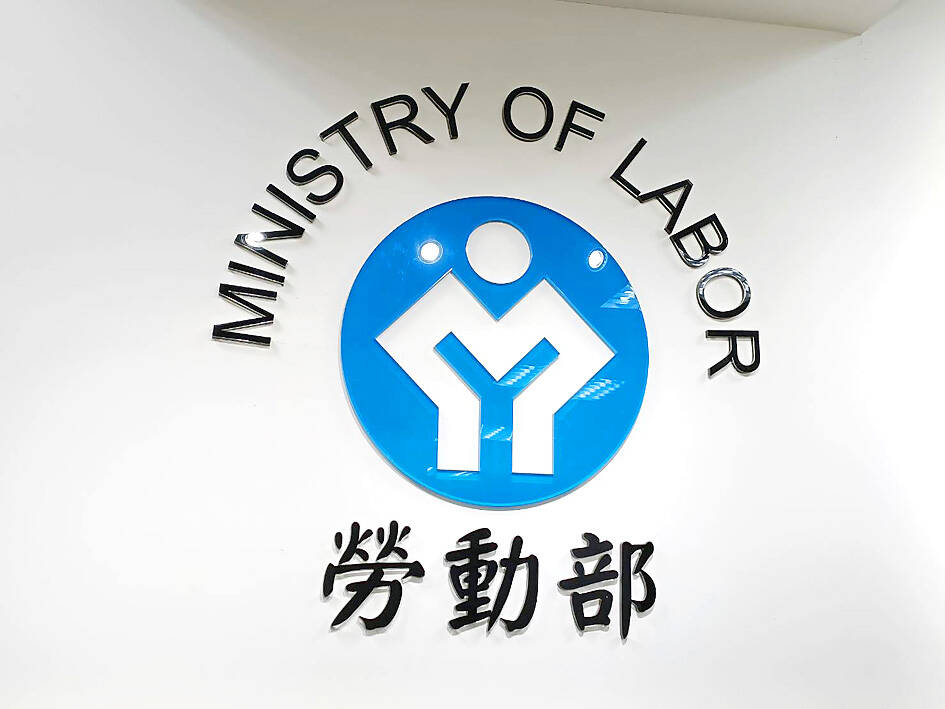To address workforce shortages, revised regulations from yesterday allow companies in manufacturing, construction, agriculture and long-term care industries to hire more migrant workers, the Ministry of Labor said.
The number of migrant workers a company can hire in the seafood processing, tofu producing and shipbuilding industries increased from 15 percent to 20 percent of total employees, the ministry said, adding that the sectors are labor-intensive and cannot be automated.
The employment ratio can rise to up to 40 percent if the companies pay the government-run Employment Security Fund an employment security fee for every migrant worker hired, it said.

Photo: Lee Chin-hui, Taipei Times
The fund was established to improve labor welfare and handle employment and management affairs involving foreign nationals, it said.
To encourage the hiring of migrant workers already in Taiwan who might have lost their job, businesses in the manufacturing sector can apply for an additional flexible allocation that would allow migrant workers to make up a further 5 percent of a company’s workforce.
To access this additional allocation, employers would need confirmation from the Ministry of Economic Affairs’ Industry Development Bureau and proof of job openings from public employment services agencies, it said, adding that an employment security fee of NT$2,000 per month for each foreign worker is required.
The number of migrant workers employed per company categorized as a “dirty, dangerous and demanding” industry must not exceed 40 percent of the total workforce, the ministry said.
Private construction companies previously could not employ migrant workers, but the new rules allow them to hire up to 8,000 migrant workers, with the potential to raise the quota to 15,000, the ministry’s Workforce Development Agency said.
Grade A, B and C construction companies, specialized construction firms and civil engineering companies that have fulfilled certain criteria in the past three years can hire migrant workers for up 30 percent of their workforces, it said.
Such companies can increase the ratio to 40 percent by paying the extra employment security fee, it added.
The quota for migrant workers in companies in the agricultural sector has doubled from 6,000 to 12,000, the ministry said, adding that the hiring ratio of local to migrant workers was raised to 1:1 for farming businesses with fewer than 10 employees.
For companies with 10 employees or more, migrant workers are limited to 35 percent of the total workforce, the ministry said.
Employers can increase the proportion to 40 percent by paying the extra employment security fee, it said.
The hiring ratio in social welfare institutions and long-term care facilities is based on licensed bed capacity, rather than the number of residents or available beds, the agency said.
The hiring ratio for social welfare institutions is one migrant worker for every three licensed beds, it said, while the ratio for long-term care facilities is one migrant worker for every five licensed beds.

Trips for more than 100,000 international and domestic air travelers could be disrupted as China launches a military exercise around Taiwan today, Taiwan’s Civil Aviation Administration (CAA) said yesterday. The exercise could affect nearly 900 flights scheduled to enter the Taipei Flight Information Region (FIR) during the exercise window, it added. A notice issued by the Chinese Civil Aviation Administration showed there would be seven temporary zones around the Taiwan Strait which would be used for live-fire exercises, lasting from 8am to 6pm today. All aircraft are prohibited from entering during exercise, it says. Taipei FIR has 14 international air routes and

Taiwan lacks effective and cost-efficient armaments to intercept rockets, making the planned “T-Dome” interception system necessary, two experts said on Tuesday. The concerns were raised after China’s military fired two waves of rockets during live-fire drills around Taiwan on Tuesday, part of two-day exercises code-named “Justice Mission 2025.” The first wave involved 17 rockets launched at 9am from Pingtan in China’s Fujian Province, according to Lieutenant General Hsieh Jih-sheng (謝日升) of the Office of the Deputy Chief of the General Staff for Intelligence at the Ministry of National Defense. Those rockets landed 70 nautical miles (129.6km) northeast of Keelung without flying over Taiwan,

City buses in Taipei and New Taipei City, as well as the Taipei MRT, would on Saturday begin accepting QR code payments from five electronic payment providers, the Taipei Department of Transportation said yesterday. The new option would allow passengers to use the “transportation QR code” feature from EasyWallet, iPass Money, iCash Pay, Jkopay or PXPay Plus. Passengers should open their preferred electronic payment app, select the “transportation code” — not the regular payment code — unlock it, and scan the code at ticket readers or gates, General Planning Division Director-General Liu Kuo-chu (劉國著) said. People should move through the

The Ministry of National Defense (MND) today released images of the military tracking China’s People's Liberation Army (PLA) movements during the latest round of Chinese drills around Taiwan. The PLA began "Justice Mission 2025" drills today, carrying out live-fire drills, simulated strikes on land and maritime targets, and exercises to blockade the nation's main ports. The exercises are to continue tomorrow, with the PLA announcing sea and air space restrictions for five zones around Taiwan for 10 hours starting from 8:30am. The ministry today released images showing a Chinese J-16 fighter jet tracked by a F-16V Block 20 jet and the